
Mott the Hoople were an English rock band formed in Hereford, Herefordshire in 1969. Originally named the Doc Thomas Group, the band changed their name after signing with Island Records in 1969. The band released albums at the beginning of the 1970s but failed to find any success. On the verge of breaking up, the band were encouraged by David Bowie to stay together. Bowie wrote their glam-style signature song "All the Young Dudes" for them, which became their first hit in 1972. Bowie subsequently produced their album of the same name, which added to their success.

Timothy John Staffell is an English rock musician, visual artist, model maker and designer. He was a member of Smile, a band that included guitarist Brian May and drummer Roger Taylor. Upon Staffell's departure, Smile were joined by Freddie Mercury and Mike Grose and later John Deacon to form the band Queen.
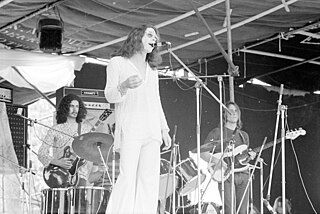
Quintessence were a rock band formed in April 1969 in Notting Hill, London, England. Their style was a mixture of jazz, psychedelic rock and progressive rock with an influence of music from India.

Luther James Grosvenor is an English rock musician, who played guitar in Spooky Tooth, briefly in Stealers Wheel and, under the pseudonym Ariel Bender, in Mott the Hoople and Widowmaker.
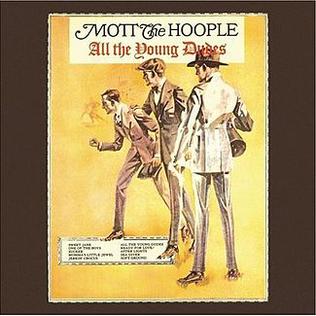
All the Young Dudes is the fifth studio album by the English rock band Mott the Hoople, released in 1972. It was their initial album for the CBS Records label, after three years with Island Records in the UK and Atlantic Records in the United States and Canada.

Mott is the sixth studio album by British rock band Mott the Hoople. It peaked at No. 7 in the UK Albums Chart. It is the last album to feature guitarist Mick Ralphs, and the first without organist Verden Allen; because of Allen's departure, most organ and other keyboard parts are played by Ralphs.
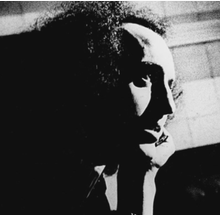
Guy Stevens was a British music industry figure whose roles included DJ, record producer and band manager. He was influential in promoting R&B music in Britain in the 1960s, gave the rock bands Procol Harum and Mott the Hoople their distinctive names and co-produced The Clash's album London Calling.
Longwave is an American indie rock band. The band was formed in 1999 by guitarist, songwriter and vocalist Steve Schiltz; guitarist Shannon Ferguson; bassist David Marchese; and drummer Jeremy Greene. The band was active from 1999 to 2008. As of 2018 the band had reformed and was recording new music. Longwave's fifth album ‘’If We Ever Live Forever’’ was released October 25, 2019.

Peter Overend Watts was an English bass guitar player and founding member of the 1970s rock band Mott the Hoople.

The Hoople is the seventh and final studio album by British rock band Mott the Hoople. The album peaked in the UK Albums Chart at No. 11, whilst its highest chart rating in the US was No. 28. It was the 85th best selling album of 1974 and was voted 16th best album of 1974 by the readers of Creem magazine. A remastered and expanded version was released by Sony BMG on the Columbia Legacy label in Europe in 2006. It was the only album to feature guitarist Ariel Bender, replacing Mick Ralphs, and the last album to feature vocalist Ian Hunter before his departure for a solo career.
Humpy Bong were an English folk rock band formed in London in 1970, by former Bee Gees drummer Colin Petersen and Irish folk rock singer Jonathan Kelly.

Ian Hunter Patterson is an English singer, songwriter and musician. He is best known as the lead vocalist of the rock band Mott the Hoople, from its inception in 1969 to its dissolution in 1974, and at the time of its 2009, 2013, and 2019 reunions. Hunter was a musician and songwriter before joining Mott the Hoople, and continued in this vein after he left the band. He embarked on a solo career despite ill health and disillusionment with commercial success, and often worked in collaboration with Mick Ronson, David Bowie's sideman and arranger from The Rise and Fall of Ziggy Stardust and the Spiders from Mars period.
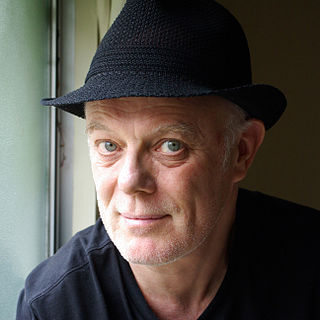
Stephen Morgan Fisher is an English keyboard player and composer, and is most known as a member of Mott the Hoople in the early 1970s. However, his career has covered a wide range of musical activities, and he is still active in the music industry. In recent years he has expanded into photography.
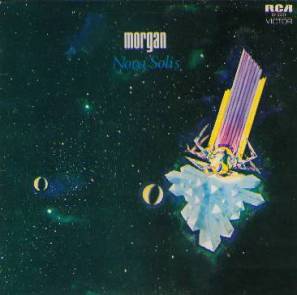
Nova Solis is rock band Morgan's first album, released in 1972.

The Hot Space Tour was the ninth headlining concert tour by the British rock band Queen in support of their 1982 album Hot Space. The tour started on the 9th of April in Gothenburg, Sweden and ended, after sixty-nine concerts, in Tokorozawa, Japan on the 3rd of November.

Two Miles From Heaven is a compilation album of tracks recorded by British rock band Mott the Hoople during their period with Island Records from 1969 to 1972. It features the original band line-up of Ian Hunter, Mick Ralphs, Peter Watts, Dale Griffin (drums) and Verden Allen (organ). Incomplete tracks from original sessions were supplemented by overdubs of vocals, keyboards and guitar.
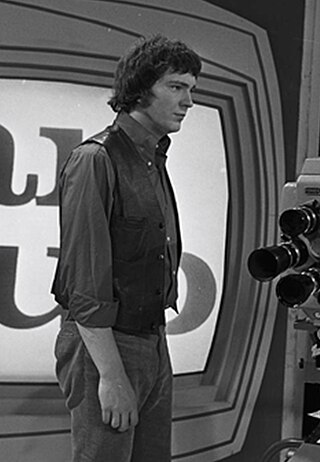
Daniel Joseph "Danny" McCulloch was an English musician best known as the bassist of the 1960s psychedelic rock group Eric Burdon and The Animals.

Love Affair were a London-based pop and progressive rock group formed in 1966. The group had several UK Singles Chart top 10 hits, including the number one success "Everlasting Love".
"Is Vic There?" is a song by post-punk band Department S, released by Demon Records on 29 December 1980. It was their first single under the name Department S, after their debut single "I'm Gonna Rough My Girlfriend's Boyfriend Up Tonight" under the name Guns for Hire.

Drive On is the debut album by British band Mott. It was released on the CBS label in the UK and the Columbia label in the United States. A remastered version was released in CD format in 2006 by Wounded Bird Records in US. It's the first album without former lead singer Ian Hunter, and includes two new members: Ray Major and Nigel Benjamin.
















